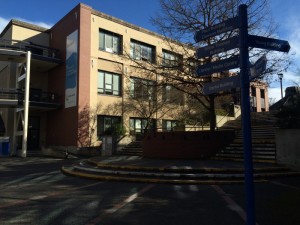The new provincial budget, which was announced on February 16, is said by the government to have been constructed with British Columbia’s families, jobs, and communities in mind. However, critics say that it fails to provide support to postsecondary institutions and students, and that it ignores increasing fees and debt that students face.
Proposals to provide funding for various postsecondary programs, among which was a plan to reinstate Adult Basic Education and ESL funding, were recommended to a committee consisting of Liberal and Opposition government officials during a budget consultation. However, none of those suggestions concerning education made it into the budget, and that has the Canadian Federation of Students-British Columbia (CFS-BC) concerned.
“It seems like this is an ideological issue with the government,” says CFS-BC secretary-treasurer Jenelle Davies. “They’re not making education a priority, and this is in line with what we’ve seen in cuts. If you can afford it, great; if you can’t, you just take out a loan and pay it off for the rest of your life. This is a commercialization of education, and it falls in line with what their actions have been on education for the past years they’ve been in office.”

George Davison, president of the Federation of Post-Secondary Educators of BC (FPSE), says that the lack of funding has already affected postsecondary institutions and educators.
“It’s already had tremendous impact,” says Davison. “It’s not just this year, it’s a cumulative effect. Ever since the Liberals have come in, the funding has effectively declined, so the numbers that we use are 20 percent less for student funding than there was in 2001, when they came in.”
CFS-BC says that many schools across the province have been increasing student fees to supplement the high cost of running their schools and programs. They say this is an attempt to bring in more money despite the two-percent cap on tuition fees.
“Fees keep going up and up because the government is not putting any money into it,” says Davies. “You’re seeing institutions do all of this really creative fee development in order to get around this two-percent cap, and it’s because the money has to come from somewhere. Institutions are in a really tight spot, and it means that students, individuals, and their families are paying more for education.”
Minister of advanced education Andrew Wilkinson acknowledges that the increasing fees are becoming a problem but claims that the Liberal government has the issue under control.
“We’re keeping a close eye on this,” says Wilkinson, “because institutions have been told that if they’re going to introduce non-tuition fees there has to be a clear and definable benefit to students. They should be reviewing them with the student body before they introduce the fees.”
Wilkinson denies some critics’ suggestions that British Columbia is falling behind other Canadian provinces with respect to affordable education.
“We are continuing our commitment to becoming the fourth-lowest tuition in the country, with a two-percent cap on tuition growth,” says Wilkinson. “We are very concerned that postsecondary education be high quality and affordable. Affordability is always in the eyes of the beholder, but with a zero-percent interest loan program that is available to all full-time students, we think that’s a very accessible education system.”
The zero-percent interest rates are only available to full-time students, and Davies stresses that the concept of affordability differs significantly between students of various economic backgrounds. She suggests that the students who may benefit the most from government assistance will not qualify for the zero-percent interest rates, simply because they cannot afford to be full-time students.
“There’s a difference between folks that are able to pursue school full time and those who are stuck doing part-time classes and working two jobs,” she says. “There’s a big difference there.”
The provincial government predicts that 80 percent of future jobs will require a postsecondary education. Davies worries that if the cost of education continues to rise, those jobs won’t be available to people from lower-income backgrounds.
“Education can provide us with a knowledge-based economy,” she says. “However, you can have the flashiest trades building, or the newest innovations at UBC or SFU, but if nobody can afford to go to school, what’s the point? That’s where we’re heading—this idea that education is only for those who can afford it, and everybody else needs to figure something else out.”
